Erik Guenther recently returned from six months of training defense attorneys for the Legal Aid Organization of Afghanistan, Kabul, as part of the U.S. Department of State's Justice Sector Support Program.
Law school doesn't teach you how to react in a hostage situation or how to recognize an improvised explosive device. But those were skills three Wisconsin attorneys - Erik Guenther, Melinda Campos, and Jeremy Arn - had to learn before reporting for volunteer duty with the Justice Sector Support Program (JSSP) in Afghanistan.
Sponsored by the U.S. Department of State, the program's stated mission is "to assist the government of Afghanistan in developing and strengthening the country's criminal justice sector, as a means to enable the courts and the professionals in the justice sector to deliver fair and effective services to the citizens of Afghanistan."
Guenther, Campos, and Arn received two weeks of training in Virginia before leaving for Afghanistan. Their training was, they note, perhaps the final stage of a weeding-out process - a last chance to turn back. It gave them a clear picture of the risks they'd face; they even wrote their own obituaries.
The risks are high, these young attorneys acknowledge. But so, they say, are the rewards.
`A Small Piece in a Very Large Puzzle'
When attorney Erik Guenther got cut off by another motorist while driving down a Madison street one day last spring, his initial impulse was to hit the horn. "I remember thinking, wait," he recalls. "This guy wasn't going to hit his brakes, and there was no explosive device on his rear bumper. I didn't get upset."
Just a few days before this incident, Guenther had returned from Kabul, Afghanistan, where for six months he trained Afghan attorneys - and where every time he got into a vehicle he faced the possibility of not coming back. It took awhile to shake that mentality after returning home on March 23, 2008.
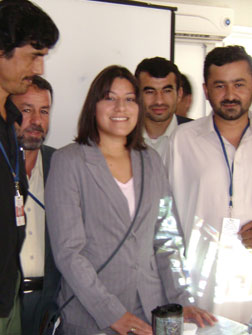
Melinda Campos speaks with students in Kunduz, Afghanistan. She is the only defense attorney in her group of American lawyers training criminal investigation police and prosecutors. Campos teaches in the classroom and mentors students in their workplaces, consulting on actual cases.
"At first it was hard for me to realize I didn't have to think like that anymore," Guenther said in a conversation three months later. "But something I hope stays with me a long time is an appreciation for what matters. When you're in a situation where there's a real risk you might not make it, it helps you keep your priorities straight."
Guenther tries to hold that thought now that he's returned to his normal daily life as a criminal defense attorney with Hurley, Burish & Stanton S.C., in Madison. He says he also came home with a deeper appreciation of the U.S. justice system.
"When I walk into a courtroom," he notes, "I know that a judge is going to let us appear and listen to my client's side. I feel grateful for all the hard work other people did a long time ago to create what is now a mature justice system."
With a constitution that's just four years old, Afghanistan is in the early stages of building its justice system. Guenther got a chance to be among those working on the ground floor of that effort while serving as a "defense mentor" with the JSSP. His primary duty was to train defense attorneys working for the Legal Aid Organization of Afghanistan (LAOA), described by Guenther as "the cream of the crop of defense lawyers" in the country. He also helped create curriculum for police, judges, and prosecutors.
In the current Afghan criminal justice system, there are two layers of prosecutors. The first works with its own investigators to look into a crime and decide whether to bring charges. Prosecutors in the second level then try the case and appear in court. A judge makes the final decision in a criminal matter; there are no jury trials and no public defender program. An accused person is allowed to present to a judge a statement, which a defense lawyer - perhaps a retired judge or prosecutor - may have helped the defendant prepare.
Dianne Molvig operates Access Information Service, a Madison writing and editing service. She is a frequent contributor to area and national publications.
"It's not what we would think of in terms of motion practice, court appearances, cross examination, and presenting witnesses on behalf of the accused," Guenther explains. "Those are only recent ideas."
Thus, defendants often have no strong advocate, and no checks are in place on prosecutors' and judges' actions. "In practice, you have a system in which corruption is rampant," Guenther points out.
As a result, the public lacks trust in the justice system and in defense lawyers. Trial dates aren't publicly announced in advance, so there's no public or media oversight of trial proceedings, and sometimes even the parties don't know when a trial will take place. People taken into custody become suspicious if offered the services of a defense attorney; they fear they're being duped.
"Because of the lack of awareness of the role of the defense lawyer," Guenther explains, "it's tough for those few lawyers doing that kind of work to operate effectively. But there are efforts under way to educate people about their rights under the constitution." That's enormously difficult, he adds, given the high rate of illiteracy and vast areas of the country lacking radio, television, and electricity.
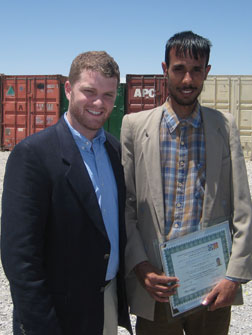
Jeremy Arn (left) teaches prosecutors and criminal investigators outside Herat, Afghanistan. A local prosecutor (right) holds a graduation certificate which, according to Arn, "is like gold to these guys."
The police support a stronger defense bar because they often face accusations of wrongdoing, such as stealing during home searches or maltreating suspects or witnesses. "The police, being on the ground, understand the value of a check on the prosecutorial function," Guenther notes.
In his classes and one-on-one consulting with defense attorneys, Guenther covered such topics as how to prepare clients and how to take clients from understanding their rights on paper to being able to exercise those rights. "We also talked about how to build credibility with judges - particularly for female attorneys," he says.
The LAOA staff includes several female attorneys, but that's unusual in Afghanistan's justice and law enforcement circles. Guenther estimates that overall only about 5 percent of the country's lawyers, judges, police, and corrections officials are women.
His main frustration during his six-month stint was the difficulty of getting even simple things done. "Everything moves more slowly than you'd like," Guenther says. "You have limitations in technology. You can't reach people you need to reach, and everybody is dealing with security issues."
All along, he kept reminding himself of advice he got before leaving Madison from John Vaudreuil, a Madison lawyer with the U.S. Attorney's Office who's made numerous trips abroad on behalf of the Department of Justice to teach in countries with emerging legal systems. Appreciate the baby steps, Vaudreuil advised Guenther, and don't expect dramatic accomplishments.
"I was a small piece in a very large puzzle," Guenther says of his service in Afghanistan. He predicts it will take 15 to 20 years of sustained effort from the international community to help the country establish a successful justice system aligned with its constitution.
What most encouraged Guenther while he was there was the hope of the Afghan people. He talked to many his age (early 30s) who had lived their entire lives in a war zone, and everyone has family and friends who were killed or injured.
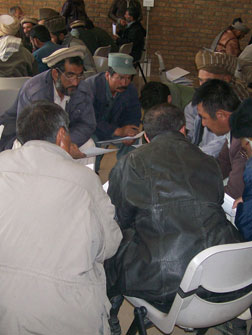
During a JSSP-sponsored Justice Training Program in Bamiyan, Afghanistan, small groups of judges, police, and lawyers worked to develop cooperation. More than 60 people participated in the training.
Still, Guenther notes, "These are people who remain hopeful their country can improve and their quality of life can be better for generations to come. That was inspiring."
He also found that the Afghan people are grateful to those who come to help. They place a high value on family, Guenther points out, and they appreciate that foreign attorneys are willing to leave their homes for many months to work in Afghanistan. "They are a good-humored, kind people," he observes, "and it's a beautiful country. That's not what we see in the news."
`It's Amazing People Want to Learn'
Melinda Campos was apprehensive when she first walked into a classroom in her role as a "justice advisor" in the Kunduz province of northeastern Afghanistan in February 2008. She wasn't sure her class - made up of male police investigators and prosecutors, mostly in their 30s and 40s - would accept a female instructor.
"I thought the first day they wouldn't look at me, or they'd walk out of the classroom," she says. "They weren't like that at all. I've been surprised. They shake my hand every day. They talk with me during breaks in our classes. I didn't think I'd be received this way."
Speaking on the telephone from Kunduz in July on the day before the graduation of her first group of students, Campos noted, "I'm going to miss these guys."
Campos, who's been a public defender in Madison since 2004, signed up for service with the JSSP because she saw it "as the opportunity of a lifetime," she says. It is also, of course, a life-endangering situation. "I'll not sugarcoat it," she says. "We're in a danger zone for sure, but we have security. You get used to how it is here, but you don't become complacent about it. You have to have a level head all the time."
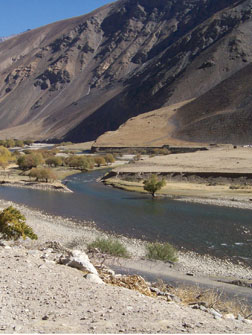
The Panjshir Valley (literally, the "Valley of Five Lions") is lush, beautiful, and rich in history. American reconstruction efforts in Afghanistan have sparked a development boom in the valley, but travel is not without risk.
She teaches and lives in a secure compound in the city of Kunduz, the provincial capital, along with about 100 U.S. military personnel, people working for U.S. government contractors, and professionals from other coalition countries who provide police training and help to build infrastructure.
Besides teaching in the compound, Campos conducts training sessions in the cities of Baghlan and Takhar, each about an hour's drive from Kunduz. "The biggest risk is when we're traveling," Campos says. "We have to wear bulletproof vests and helmets when we're on the road, and we're in an armored vehicle. Our security team is armed."
Still, "It is nice to get out," Campos adds. "The scenery is so beautiful."
The teaching team Campos works with on a daily basis includes two other American lawyers, three Afghan lawyers, and three interpreters. The hope is that the Afghan lawyers can carry on this work in the future. "We're trying to establish sustainability," Campos says. She is the only defense attorney in her group. In fact, she notes, the entire Kunduz region, with a population of nearly 600,000, has only seven defense attorneys.
The recently enacted Advocates Law will create a formal defense bar and a public defender system in Afghanistan. It also will establish new consumer protections. Currently anyone, even someone with no training, can hang out a shingle claiming to be an attorney.
In her first six months, Campos has been training criminal investigation police and prosecutors. "We're trying to establish cooperation and coordination between the two groups," Campos says. She hopes to gain approval to do a second six-month stretch in Afghanistan and eventually to get a chance to train defense attorneys.
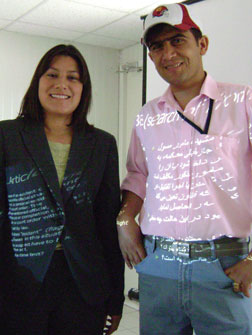
The teaching team Melinda Campos works with includes legal interpreter Shirullah Habibi (pictured) and two other interpreters, two other American lawyers, and three Afghan lawyers.
She describes the training she provides as information sharing, in both directions. The instructors "brainstorm with the students," she says, "about steps to take to curb corruption, to make sure cases are investigated correctly." Class discussions cover a range of topics: crime-scene investigations, search and seizure procedures, ethics, handling domestic violence incidents, and more.
In addition to teaching in the classroom, Campos also mentors students in their workplaces, consulting on actual cases. "We want them to know we'll make the effort to visit them," she says, "and it's good for us to see the reality of the issues they're facing."
The police and prosecutors in her class work in tough conditions in various parts of the Kunduz province. Their offices are sparsely furnished and have no air conditioning. Supplies are lacking. Even acquiring a few legal pads can be impossible.
The country's decimated infrastructure and economy add to the problems. "Daily life is a struggle here," Campos observes. "It's amazing people come to class and want to learn."
All those in Campos's class are literate, which she says is uncommon among police and prosecutors in the Kunduz province. Many educated Afghans fled the country in the past few decades, so less-educated people had to fill police and prosecutor positions. Enhancing their professionalism is one goal of the training Campos and others provide.
Although it may seem odd to Americans that lawyers are unable to read and write, Campos explains that many Afghan prosecutors fulfill different roles than their U.S. counterparts. They're criminal investigators, not courtroom attorneys, and they can perform their duties well, even though they're illiterate.
In her experiences in Afghanistan to date, Campos says she's most encouraged by the country's people. "They have a lot of pride in their nation," she notes. "They want to make changes, so it's not an issue of them not wanting change. But this is a very poor society. We have to try to give them a boost."
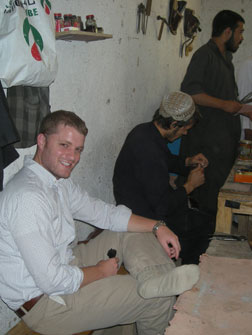
In addition to teaching classes, Jeremy Arn (left) works with the monitoring prosecutor at the Herat Men's Prison. Next to Arn, a prisoner, who works as a cobbler at the prison, repairs Arn's shoe.
`They Thank Me for Coming Here'
Jeremy Arn's experiences since he arrived in Afghanistan last March have been much like those of Guenther and Campos, with some extra danger added. "Things have begun to heat up here in the past month or so," he wrote in an August email from Herat, a city of 600,000 in northwest Afghanistan. He was answering questions about his experiences via an email exchange, given the poor connections in Herat to the Internet and by cell phone to the states.
On assignment as a "justice advisor" with the JSSP, Arn works and lives with some 200 other people in a secure compound just outside the Herat city limits. Three times in the month preceding his August email the compound had been the target of nighttime mortar attacks, which sent Arn scrambling from his bed to a nearby bunker.
At such times he wonders what he's doing here, Arn admits. "The questioning gets intense when I'm sitting in a bunker in the middle of the night."
Arn is on leave from the Racine County District Attorney's office, where he's worked for four years. In Herat, he's teaching prosecutors and criminal investigators. Some are locals and some come from southern provinces to which Arn and his teaching team - including two other American attorneys, three Afghan attorneys, and three Afghan interpreters - can't go because of security concerns.
The compound's security is in the hands of Gurkhas, ex-military Nepalese who are descendants of warriors and have a reputation for their loyalty, courage, and battle skills. Arn and his two fellow American attorneys have a personal security team of five Gurkhas. "I have no doubt that each one of them would take a bullet for me," Arn says. "They are also the nicest, most humble people I've ever met."
Besides holding classes in the compound, Arn and his teaching colleagues travel by armored vehicle a couple of times a week to the prosecutor's office and police headquarters downtown. On these and other ventures outside the compound, Arn dons a bulletproof vest and helmet.
"My job while riding," he says, "is to look out my side of the vehicle for IEDs [improvised explosive devices] and suicide bombers. Everyone is completely silent during the ride. A 10-minute ride feels like an hour. I usually feel physically drained by the time we reach our destination, just from sitting there, watching."
His students are "very bright and most know the Afghan penal code and criminal procedure codes inside and out," Arn says. "Many have been prosecuting longer than I've been alive." Those who come in for training from the southern provinces have no more than high school educations.
The vast majority of his students are men. Still, the chief prosecutor of the Herat province is Maria Bashir, the only female chief prosecutor in Afghanistan. "She is a very brave woman," Arn notes. "She has had numerous threats on her and her family's lives since she was appointed by President Karzai. She's not afraid to prosecute the corruption that runs rampant here."
Arn's classes cover diverse criminal law topics. Key underlying themes are improving police-prosecutor coordination and combating corruption - a huge problem, Arn says. Corruption feeds public mistrust of law enforcement officials, and thus many crimes go unreported. "As a result, the security situation worsens," Arn says.
But, he adds, when an official takes a bribe, it's often a matter of survival, rather than moral failure. Prosecutors, for instance, make $65 a month. Many have to hold down a second job to get by. The U.S. Department of State pays prosecutors and investigators a $5-per-day stipend for attending JSSP classes. Still, when Arn told his class about the stipend, some raised their hands to protest it was too much.
"These guys are the good guys here," he says. "They truly want their country to improve. After all the war, all the regime changes, all the corruption, all the mistrust from the public, all the danger that comes with working in their jobs, they still do it. Day in and day out. For $65 a month! And they continually thank me for coming here. It is very humbling."
One of his most dismaying experiences has been discovering the conditions his students face in their jobs. For instance, criminal investigators and prosecutors in southern provinces must take taxis to crime scenes, paying out of their own pockets, because they have no other means of transportation. Plus, because they're often first on the scene, they must provide emergency medical care to those who need it, because ambulances are nonexistent. During the JSSP training, "We had a doctor come in to teach a first-responder class," Arn says. "We also provided our students with first-aid kits, which none of them had, to take back to their offices."
A key challenge for Arn is impressing on his students the importance of correctly applying the Afghan penal code and criminal procedure codes. In practice, prosecutions sometimes become a hybrid of Sharia law, derived from the Koran, and Afghan secular law.
For example, running away is often prosecuted; even though it's not a crime according to the Afghan penal code, it's against Sharia law. Arn notes that in a recent class, a student asked whether he should arrest a man for attempted adultery because the man, while waiting in line at the market, turned around and winked at the woman behind him. Arn stresses to his students that they must assemble evidence to prove their cases.
"There is a long way to go here," Arn says. "But I have seen progress in the way most of our students are thinking about and applying the law. That's encouraging. That's what has kept me here."
Cover photo: Copyright Wisconsin State Journal, Reprinted with Permission.
